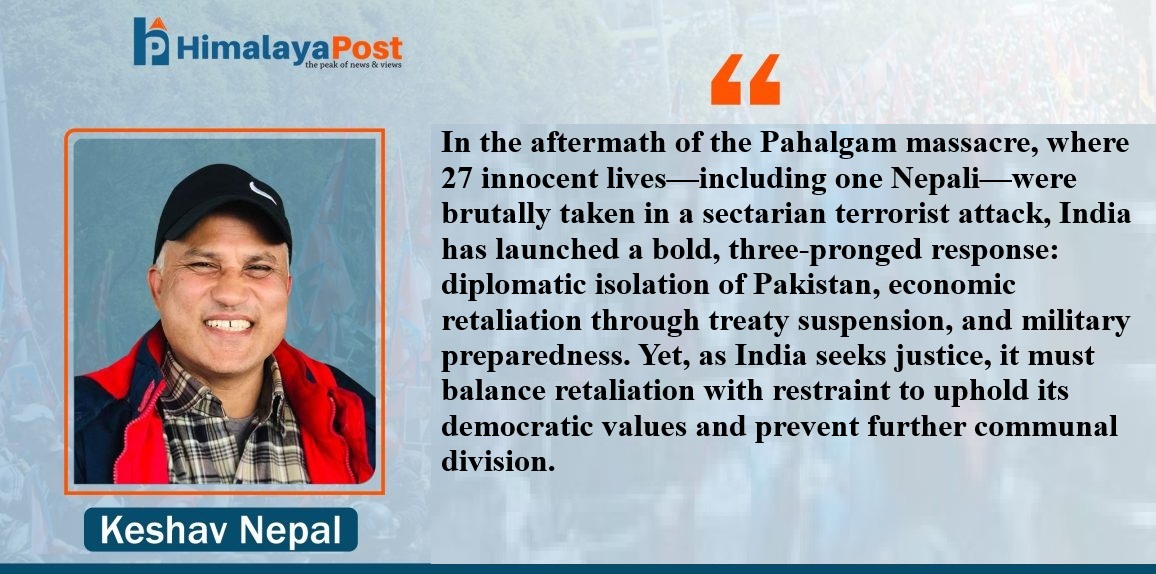-Keshav Nepal
Kathmandu- What was once the idyllic valley of Pahalgam, a symbol of Kashmir’s famed serenity, was transformed this week into a theater of unimaginable horror. In a brutal terrorist attack, 26 Indian civilians and one Nepali national were slaughtered—targeted not for what they did, but for who they were. Eyewitnesses recount a chilling scene where the attackers forced victims to strip to check for circumcision, singling out non-Muslims for execution in what can only be described as an attempted genocide.
This gruesome act follows a series of incendiary statements from Pakistan’s Army Chief, whose recent outbursts against India and Hindus now seem less rhetorical and more strategic in hindsight. It was a fire further stoked by certain irresponsible voices within India who used the recent Baqf Amendment Act debate to spew venom, inadvertently emboldening extremists across the border. The massacre in Pahalgam is not merely a tragic loss of life; it marks a dangerous escalation in cross-border terrorism and presents a defining test for India’s counterterrorism and diplomatic strategy.
A Disturbing Pattern, A New Threshold
The Pahalgam attack bore all the hallmarks of Pakistan-backed jihadist groups: precise operational execution, sectarian targeting, and strategic timing aligned with escalating rhetoric. This is not a one-off incident—it is the latest chapter in a decades-old playbook where extremist ideologies are nurtured under the shadow of state complicity, where proxy warfare is waged under the guise of plausible deniability.
Pahalgam must be understood for what it is: not a spontaneous eruption of violence, but a calculated act of terror designed to further fracture communal harmony, undermine Indian sovereignty, and destabilize an already volatile region.
Prime Minister Narendra Modi’s reaction was immediate and unequivocal: “We will pursue these terrorists to the ends of the earth.” It was more than a statement—it signaled a clear shift. No longer would India respond with just condemnation; it would respond with concrete, deliberate action.
India’s Three-Pronged Response
New Delhi’s response has been swift, sweeping, and strategic. Diplomatically, India expelled multiple Pakistani military attachés, cut staff strength at Pakistan’s High Commission by 45%, and suspended all bilateral visa services. These measures send an unmistakable message: business as usual is over.
Economically, India has crossed a historic threshold by suspending the Indus Waters Treaty—a foundational agreement regulating river waters between the two nations—and shutting down the Attari-Wagah border crossing. These decisions, while risky, show India’s willingness to impose serious costs on Islamabad’s continued duplicity.
On the military front, India has intensified counterterror operations in Kashmir, recalibrating its security strategy to focus on precision, deterrence, and preemption. Defense attachés have been recalled, and special forces units have been put on high alert. This is not reckless saber-rattling—it is preparation, backed by sober recognition of the stakes involved.
Global Condemnation and a Rare Consensus
The world, too, has taken notice—and this time, with a rare unity of purpose. Leaders from across the spectrum—US President Donald Trump, French President Emmanuel Macron, UK Prime Minister Keir Starmer, Italian Prime Minister Giorgia Meloni, Russian President Vladimir Putin—joined voices in unequivocally condemning the attack and affirming solidarity with India.
Major regional powers, including the UAE, Saudi Arabia, China, and Sri Lanka, echoed these sentiments. Even Nepal’s Prime Minister, K.P. Sharma Oli, pledged full coordination with India in assisting the family of the Nepali victim and denounced the act as “an assault on humanity itself.”
Such a breadth of international condemnation places significant pressure on Pakistan, reinforcing the message that the world’s patience for state-sponsored terror has worn thin.
A Dangerous Path Ahead
Yet, the risks of escalation cannot be dismissed lightly. Analysts highlight three critical dynamics that could shape the coming weeks: India’s enhanced military capabilities since the Balakot airstrikes of 2019; Pakistan’s crumbling economic and political foundations; and the volatile danger of nuclear-armed adversaries facing off across a disputed border.
Compounding these dangers is the emerging humanitarian fallout. Reports of Kashmiri students facing harassment across India, and border residents living under fear, reveal the deeper social fractures such crises expose. Retaliatory violence against innocent civilians risks undermining India’s moral standing and feeds directly into Pakistan’s victimhood narrative.
Justice must be pursued without losing the greater battle for India’s pluralistic soul. Retaliation must not mutate into collective punishment.
The Road Ahead: Challenges and Choices
In this charged atmosphere, India must navigate three urgent priorities:
- Deliver a strategic counterterrorism response—not merely punishing foot soldiers but dismantling the infrastructure of terror at its roots.
- Maintain international legitimacy—ensuring that unilateral actions to safeguard national security are matched by clear diplomatic communication and multilateral outreach.
- Protect civilians—especially vulnerable communities like Kashmiri Muslims—from the backlash that violent rhetoric and anger can unleash.
Whether the Pahalgam massacre becomes just another bloody entry in a long ledger of grief—or a pivotal moment that reshapes regional dynamics—depends on the choices made now, by India and by the international community.
Until Pakistan’s terror infrastructure is dismantled brick by brick, Kashmir will tragically remain both a battleground and a bargaining chip in a cynical geopolitical struggle. But the memory of the 27 innocent souls lost must not be allowed to fade into the endless noise of recrimination and retaliation.
It must instead become a rallying cry: for justice, for security, for a peace that is real—not merely the pause between tragedies. Because peace without justice is no peace at all.





